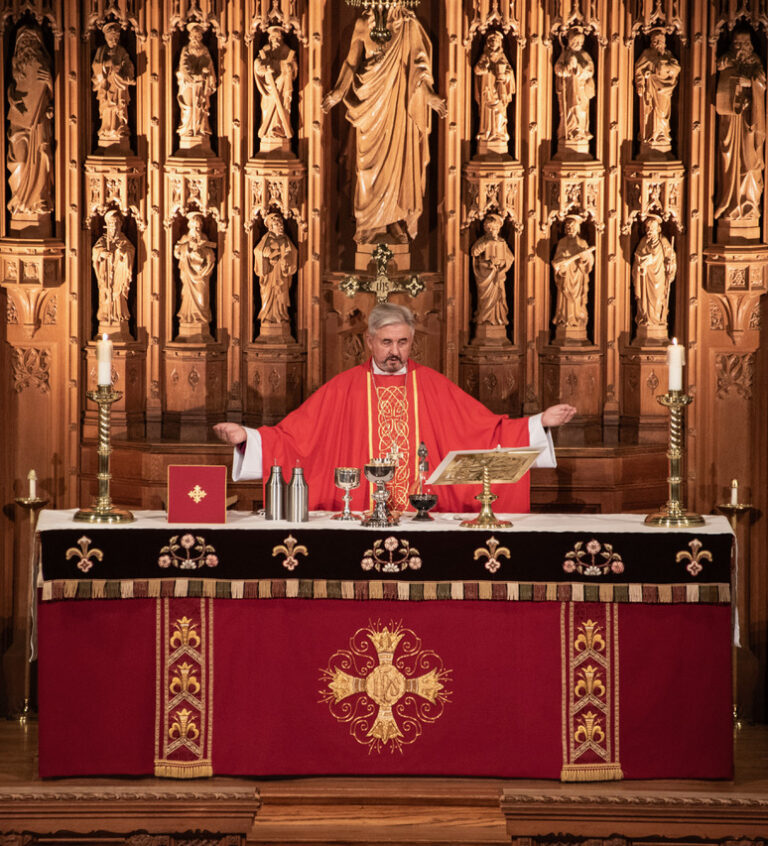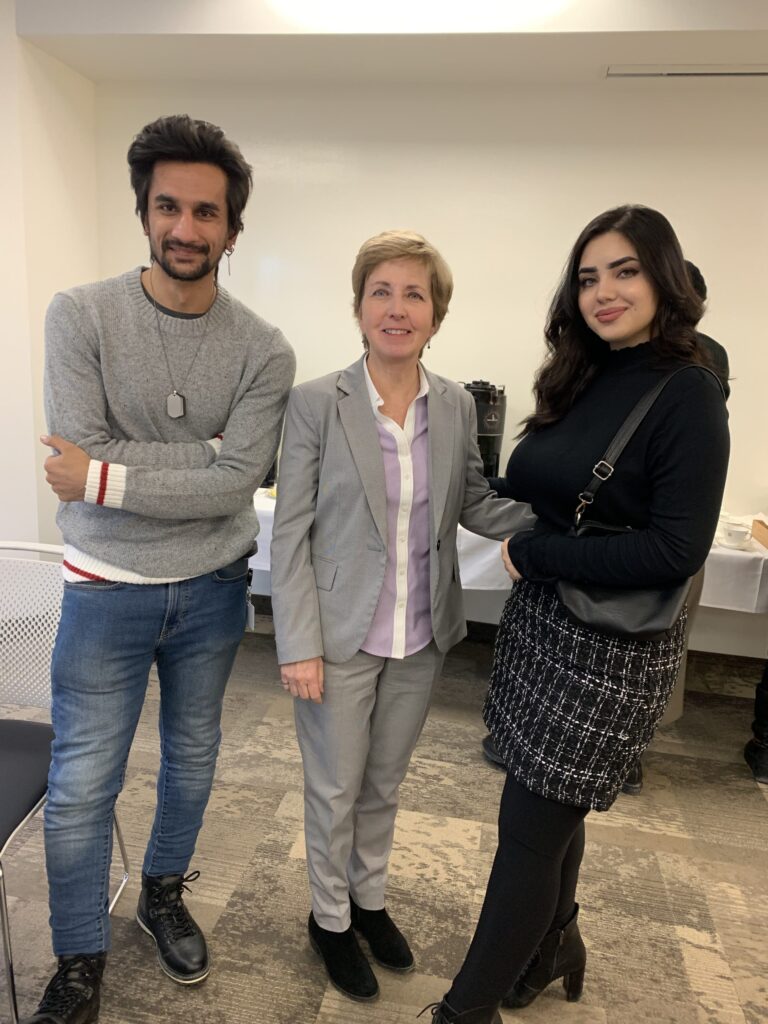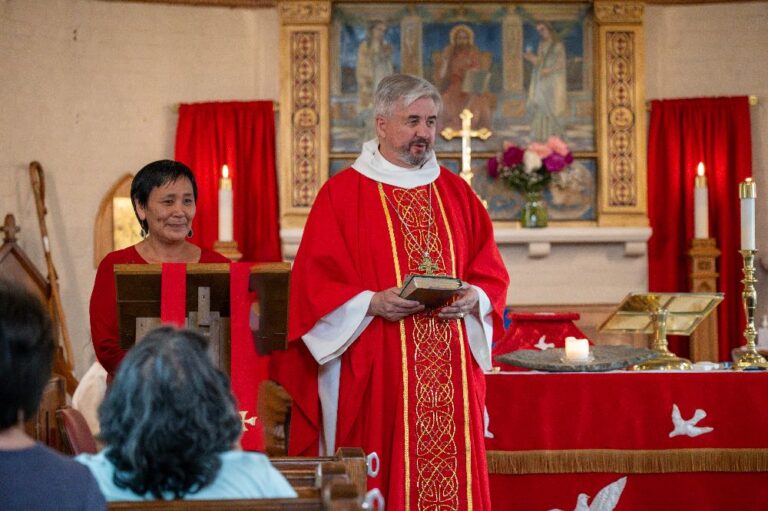The Bishop’s Charge to Synod – 2023
As for you, always be sober, endure suffering, do the work of an evangelist, carry out your ministry fully.
2 Timothy 4:5
![]() The first reading for the feast of Saint Luke is from Paul’s second letter to Timothy, written near the end of his life. The tone of the letter is very personal, for Paul is writing to give encouragement to Timothy as he strives to continue the work Paul himself had passed on to him in Ephesus.
The first reading for the feast of Saint Luke is from Paul’s second letter to Timothy, written near the end of his life. The tone of the letter is very personal, for Paul is writing to give encouragement to Timothy as he strives to continue the work Paul himself had passed on to him in Ephesus.
Paul’s first letter to Timothy was much different, focusing on the organization and leadership of the church. Paul was concerned that the new church in Ephesus be properly ordered and well-run, with clear expectations around structure, roles, doctrine, and worship. Paul was particularly concerned that the church’s leaders—especially bishops—be properly qualified and committed to the building up of the church (rather than their own egos).
In his second letter, Paul understands Timothy and his church face many distractions and fears, and he knows maintaining good order, staying cohesive, and remaining focused on sharing the good news of Jesus Christ will see them thrive. He advises Timothy to keep his eyes wide open, to take loss in stride, to focus on sharing God’s love, and to do his ministry whole-heartedly.
The theologian Henry Chadwick lectured at Cambridge and Oxford during his prolific career, and was an expert in the history of the early Church. His studies led him to describe the church as a stained-glass window—reflecting through its diverse panes the beauty of God’s grace, love, peace, hope, reconciliation, and justice. And like a stained-glass window, which on its own cannot withstand the assaults of the elements in its environment, the church needs to be held in this world by the oak and iron of good order and discipline.
Much like Paul in his letter to Timothy, Professor Chadwick realized the structures and operations of the Church—being well-run and properly resourced—enable cohesion amongst its members and frees them to focus on serving outward.
![]() The people and clergy of our diocesan church have joined me in a three-year journey of honestly assessing where we are at, and of carefully and collaboratively discerning what God is calling us to do.
The people and clergy of our diocesan church have joined me in a three-year journey of honestly assessing where we are at, and of carefully and collaboratively discerning what God is calling us to do.
In 2020 the Shape of Parish Ministry Consultation (SPMC) was initiated, and during 2021 we heard that our parishes are challenged by volunteer fatigue, property and administrative responsibilities, finances, evangelism, and aging congregations. We also heard that our clergy and lay leaders are motivated to work together more, reach more people, enrich their discipleship, clarify and support shared roles, and to make changes.
In 2022 we crafted three major proposals which were resoundingly approved by Synod last October. Since then, we have focussed on developing and implementing the Eleven Actions called for in those proposals. During this Synod, we will see how each one of the Eleven Actions has been addressed, and how they combine together to bring about tangible changes to the way we operate and support our parish ministries.
Here is a synopsis of the results we hope to see as we make the changes called for a year ago:
1) there will be less reliance on parish revenues to fund the operating budget of our diocese;
2) diocesan staff will provide increased assistance and support to parish leaders as they manage parish finances, properties, stewardship, communications, human resources, and administration; 3) our Bishop will provide guidance to parishes facing major changes, and will promote and enable innovation and collaboration; 4) parish officers and leaders will receive training and more learning opportunities, and there will be a clear understanding of how parishes operate; 5) a Learning Commons and a Program for Parish Development will provide resources, knowledge, and practical instruction on all essential aspects of parish ministry; and 6) we will learn how to practice contextual mission as we engage with the world and establish new worshipping communities.
If this year’s Synod approves the proposed Plan for Parish Development, the Action Plan for Contextual Mission & New Worshipping Communities; and the Plan for a Future Fund, we will be poised to rapidly operationalize every one of the Eleven Actions called for in the SPMC Proposals we overwhelmingly endorsed a year ago.
![]() This Synod will also be asked to approve a new three-year operating budget. An important feature of the revenue side of the proposed budget is a significant decrease in the category we will now call Proportional Parish Share (PPS). This has happened because we combed through the trusts we hold collectively as a diocesan church, and, wherever possible, are now using dividends from them to support our operating budget. Using our central financial resources in this way places less demand on money from our parishes to cover our central operations.
This Synod will also be asked to approve a new three-year operating budget. An important feature of the revenue side of the proposed budget is a significant decrease in the category we will now call Proportional Parish Share (PPS). This has happened because we combed through the trusts we hold collectively as a diocesan church, and, wherever possible, are now using dividends from them to support our operating budget. Using our central financial resources in this way places less demand on money from our parishes to cover our central operations.
The same approach will be used concerning Equalized Cost of Priestly Services (ECOPS): wherever possible, dividends from trusts we hold collectively as a diocesan church will be used to offset the pay fund—understanding that, at this time, the amount we can apply is relatively small.
This points to a new operational priority for us: to develop our central resources so we can continue to offset or cover the costs of our operations and staffing. Just as every one of our parishes must seek to engage in effective financial stewardship and develop three streams of revenue from offerings, property, and endowments, we, as a diocesan church, must do the same.
The resources to be provided through our new Learning Commons and Parish Development Plan will help build the financial capacity of every parish, and Ascension House will follow suit— relying on the guidance of our Director of Communications and Development to increase our capacity to contribute to the costs of our parish ministries and to increase our ability to fund our community ministries. Our five community ministries, in turn, will continue to rely on their excellent reputations to increase fundraising, with close support from Ascension House.
Remember: our diocesan church is a body with two arms: parish ministries and community ministries. Our diocese, not the diocese. We, not they. Every parish is ours. Every community ministry is ours. And it all belongs to Christ. We are in communion with one another, deeply and inextricably. We are strong together and we can build our capacity to serve those who seek God’s love in a community of faith and those who cry out for justice, compassion, shelter, and respect.
![]() In our baptismal covenant we vow to seek and serve Christ in all persons, to strive for justice and peace among all people, and to respect the dignity of every human being. This is clearly intended to be accompanied by meaningful action.
In our baptismal covenant we vow to seek and serve Christ in all persons, to strive for justice and peace among all people, and to respect the dignity of every human being. This is clearly intended to be accompanied by meaningful action.
This Synod will hear about the intensification of need and danger on the streets of our diocese, and how our community ministries are being called upon to meet this rising tide. The opioid crisis is a very real part of the distress on our streets, and the housing crisis is a major contributing factor.
We continue to do our part to increase the stock of affordable housing, but as we wrap up our goal of providing 125 new units for our 125th anniversary, we need to restate our commitment. At a recent meeting with our Homelessness and Affordable Housing Working Group (HAWG), we agreed to define a new affordable housing strategy for our diocese, to be adopted by Synod in 2024. In the meantime, we will continue to seek out opportunities to support new affordable housing initiatives—as many of our parishes are doing in their local communities.
Our church has consciously chosen to walk the path of reconciliation, enabling indigenous and non-indigenous people to form relationships based on mutual respect. Reconciliation is a way of life and our many efforts to stay on the path and enliven it are commendable. In the new year, I look forward to inviting National Indigenous Archbishop Chris Harper to visit St Margaret’s Inuit congregation and to share with all of us stories of Sacred Circle, the new self-determining Indigenous Anglican church.
Reconciliation includes a commitment to anti-racism, acknowledging the inherent racism of the Indian Act and the disproportionate suffering of Indigenous People in our country, as well as the abhorrent racism directed at Black and other racialized people. We continue to address racism and to promote diversity, equity, and inclusion through Project Anti-Racism, which has moved from creating awareness among key diocesan leaders to educating people in congregations. Our commitment to anti-racism is now built into the Action 8 plan to train and support parish leaders, and has already begun with in-person parish workshops facilitated by trained clergy and lay people.
![]() We are in a cherished partnership with the Episcopal Diocese of Jerusalem. Archbishop Hosam Naoum and I first met in 2004, when he was a parish priest in Nablus on the West Bank. Our friendship has been integral to the partnership between our dioceses—which has roots in the 1990’s and early 2000’s before it was formalized about 15 years ago. It has comprised pilgrimages, visits, courses, exchanges, advocacy, a women’s conference, parish partnerships, and financial support for health care institutions operated by the Diocese of Jerusalem. In March, at St George’s Cathedral in Jerusalem, I had the honour of naming +Hosam as a Canon of Christ Church Cathedral Ottawa, to mark the close bonds of affection between our diocesan churches.
We are in a cherished partnership with the Episcopal Diocese of Jerusalem. Archbishop Hosam Naoum and I first met in 2004, when he was a parish priest in Nablus on the West Bank. Our friendship has been integral to the partnership between our dioceses—which has roots in the 1990’s and early 2000’s before it was formalized about 15 years ago. It has comprised pilgrimages, visits, courses, exchanges, advocacy, a women’s conference, parish partnerships, and financial support for health care institutions operated by the Diocese of Jerusalem. In March, at St George’s Cathedral in Jerusalem, I had the honour of naming +Hosam as a Canon of Christ Church Cathedral Ottawa, to mark the close bonds of affection between our diocesan churches.
It is with heartfelt joy that we warmly welcome to this Synod the Very Reverend Canon Richard Sewell, Dean of St George’s College Jerusalem, and his wife JulieAnn, who works at the Jerusalem Princess Basma Center—two institutions well-known to many of us. And it is with heart-breaking concern and sorrow we see the obscene violence unfolding in Israel and Palestine. On October 17, as we joined in Archbishop Hosam’s call to pray for peace and reconciliation, hundreds of displaced Palestinian citizens, gathered in the courtyard of the Al Ahli Arab Hospital in Gaza City, were decimated by an exploding weapon. The hospital is run by the Episcopal Diocese of Jerusalem. We will listen well to the first-hand news Richard and JulieAnn bring to us, and we will continue to support our beloved partners who are surrounded by war and mayhem in the land of the Holy One.
![]() Like Paul’s advice to Timothy, and like Professor Chadwick’s observations on the church, we come to this Synod rightly concentrated on the oak and iron that holds our church together, and we will soon be well-positioned to guide change and thrive rather than be changed by external factors.
Like Paul’s advice to Timothy, and like Professor Chadwick’s observations on the church, we come to this Synod rightly concentrated on the oak and iron that holds our church together, and we will soon be well-positioned to guide change and thrive rather than be changed by external factors.
The reason we need to be well-run and well-resourced is so we can focus outward with humble confidence and expansive generosity—as a resource to the wider community around us, sharing in God’s mission to bring the whole world into the orbit of Christ’s love.
We need to learn how to do this. We need to remind ourselves God is already at work in the world, and our task is to participate in God’s work by listening in a new way to the Holy Spirit— because we cannot afford to repeat the colonial mistake of thinking we have the agenda in hand and have to get others to follow it.
Instead, we must learn new skills which allow us to discern and understand how the Holy Spirit is already active in the people and communities around our churches—and when we have done this, we then need to ask how God is calling us to use our gifts and resources to enable God’s work in the rural areas, villages, towns, and cities of our diocese.
This is what contextual mission is all about. It is Spirit-led and we need to learn how to be led and how to discern what work God is doing—and where we are being called to share in it.
We will continue to attend to the oak and iron because it holds the glass that reflects the beauty God has placed in us, the beauty of God’s grace, love, peace, hope, reconciliation, and justice. From a place of renewed strength, we can listen more attentively to the Holy Spirit and share that beauty wherever God calls us to be.
Amen+
The Right Reverend Dr. Shane A. D. Parker
Bishop of Ottawa
Bishop’s Charge to Synod – October 19, 2023
Related Articles
February 1, 2023
Refugee ministry meets with Australian High Commission
May 30, 2024



